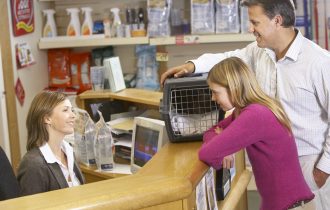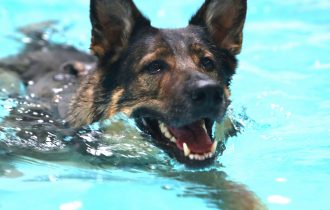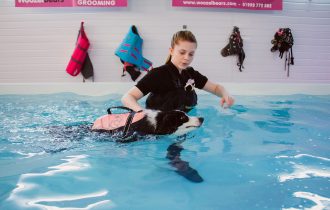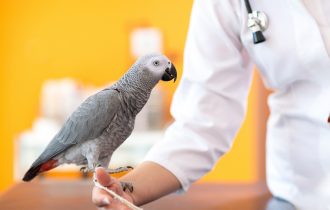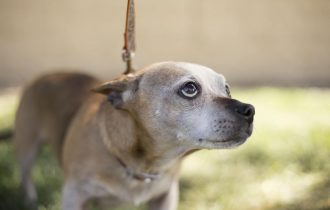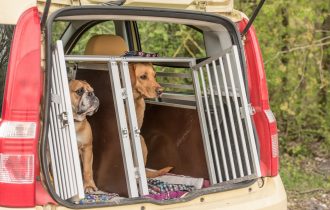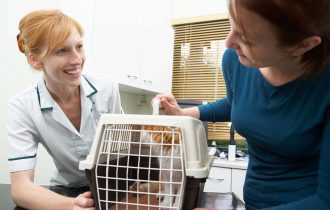Looking for a Veterinary Career?
We have listed several vet careers and these include the most obvious ones; Veterinary Surgeon and Veterinary Nurse, as well as Nursing Assistant, Veterinary Receptionist and Veterinary Care Assistant. Relevant training is essential
Veterinary Nurse: This popular veterinary career broadly involves the hands on nursing care for sick or injured animals, educating owners about pet health and welfare and the carrying out of medical treatments and minor procedures. A veterinary nursing qualification can lead to many different job opportunities in animal welfare. The duties of a qualified Veterinary Nurse involve a considerable amount of responsibility. Senior nurses play a key role in the running of a private practice or organisation.
The current veterinary nursing qualification is the Royal College of Veterinary Surgeon’s (RCVS) Level 3 Veterinary nursing Diploma, this course takes around 3 years to complete. To gain entry on this course students must have the following:
5 GCSEs at grade C and above which must include English language, maths and a science subject
Career prospects are good for skilled veterinary nurses. There is a strong demand for well-trained animal care professionals and opportunities are open to nurses in a variety of animal care jobs. As a qualified veterinary nurse, you could develop a veterinary career as a head nurse in general practice, in a specialised veterinary referral centre, in the equine world, as a veterinary practice manager, in an animal charity/welfare/hospital nursing environment, in academia as a lecturer or researcher, within the pharmaceutical and veterinary supplies industries.
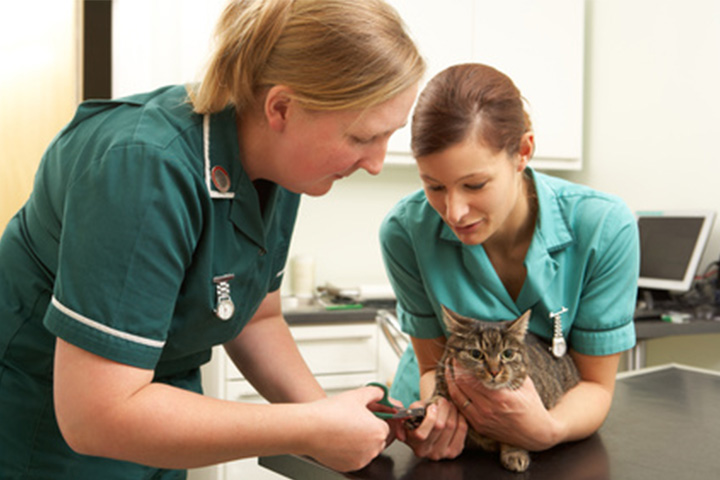
The Ofqual regulated Level 2 Diploma for Veterinary Nursing Assistants is the entry qualification for careers within a Veterinary Practise, along with functional skills level two in application of numbers and communication.
Veterinary Careers
-
Animal Hydrotherapist and Small Animal Hydrotherapist Careers in Hydrotherapy
View Recommended TrainingWhat is a Small Animal Hydrotherapist?
Small Animal Hydrotherapists use hydrotherapy techniques (often in a specialised pool) to help animals to recover from injury or as part of pain management. Some animals require Hydrotherapy treatment for pain management after an operation and some need it to stay healthy or for weight control – particularly if they suffer from obesity.Small Animal Hydrotherapists commonly work with dogs of all shapes and sizes, but they also have the skills to provide hydrotherapy treatments for cats, rabbits, and even small cattle such as sheep, goats, and even ponies.
Small Animal Hydrotherapists can also be known as Veterinary Hydrotherapists or Canine Hydrotherapists if they only have patients that are dogs.
Why is Hydrotherapy beneficial for Animals?
Hydrotherapy uses a low impact on an animal’s body. Water allows the animal to move in a buoyant environment and can provide several health benefits including:- Joint Flexibility
- Improve Mobility and Movement
- Reduce Joint Pain
- Build Strength
- Muscle Circulation
- Cardiovascular Fitness
Animals are often referred to Hydrotherapist by a qualified Veterinary Surgeon. Hydrotherapy in conjunction with veterinary treatment can increase the healing process and can improve their general fitness and help aid recovery from injury.
There are several pre-existing conditions that animal patients have that would benefit from using Hydrotherapy as a form of treatment. These are commonly known as:
- Muscle and ligament Injuries
- Sprains
- Broken Bones
- Hip Dysplasia
- Spinal Injuries
- Paralysis
- Post-operative Muscle Regeneration
- Osteochondritis Dissecans (OCD)
- Obesity
- Weight Control
Where do Hydrotherapists work?
As animal Hydrotherapy has grown in popularity, Hydrotherapists are now located in all sorts of animal-related businesses. Often you will find a standalone, private Hydrotherapy centre but you can also find them within Veterinary Practices, Veterinary Hospitals, Dog Grooming Salons and even associated with Horticultural businesses such as Animal Physiotherapy Centers.
What soft skills do you need to become a Small Animal Hydrotherapist?
To consider a career as a small animal hydrotherapist, there are several soft skills that are required to become successful.- Compassion for Animal Care
- Physically Strong
- Ability to Swim
- Eager and fast learner
- Charisma for Patient and Customer Care
- Time Management
- Organisational Skills
Firstly, Animal Hydrotherapists must show compassion for animals. They are often helping animals who are in pain therefore empathy and understanding of this will help them work with their animal patients. Hydrotherapists in training will practice Hydrotherapy techniques in water, using treadmills and various equipment and tools. Therefore it is a necessity that they are strong swimmers, who can lift and move animals carefully. It is also important to be good with time management, Hydrotherapists will be working under a tight schedule with dedicated slots for specific treatments and routines. Having organizational skills to juggle customers, clients, and patients with the ability to multitask is advantageous.
How much does a Small Animal Hydrotherapist earn?
Junior or recently qualified Small Animal Hydrotherapists can earn anything between £9.00-£14.00 per hour which is around £20,000 per annum. However, an experienced Hydrotherapist with more than one qualification or specialism can earn up to £65,000 per annum.How do to become a qualified Small Animal Hydrotherapist?
Having a regulated qualification is essential to work as a registered animal Hydrotherapist. In the UK, you can become qualified with a Level 3 Diploma or Certificate. The qualification must be Ofqual regulated and include several days of practical hands-on experience.The Level 3 Certificate in Small Animal Hydrotherapy is the fastest way to get an Ofqual regulated qualification in Small Animal Hydrotherapy that can be used around the world. This qualification includes 4 days of practical training at a Hydrotherapy approved training centre.
Alternatively, if you wanted to obtain a unique advantage in the Hydrotherapy sector then you can gain your Level 3 training with a qualification combined with the Level 6 Diploma in Veterinary Physiotherapy. This qualification once completed will allow learners to become registered Small Animal Hydrotherapist and Veterinary Physiotherapist in one sitting.
For all related courses, training and qualification please visit the Hydrotherapy course page.
How can you become an Advanced Animal Hydrotherapist?
Hydrotherapists who have completed their Level 3 training and qualification will often seek out further training from Level 4 – Level 6 or by adding further skills in Aquatic Advanced treadmill by focusing on gait analysis and biomechanics. Alternatively, Hydrotherapists can train to treat animals both in and out of the water by training to become a Veterinary Physiotherapist, this is a sort after and complementary skill.
Advanced Hydrotherapists can advance their skill set by studying the following Ofqual regulated qualifications:
Level 3 Award in Advanced Aquatic Treadmill Therapy for Small Animals
Level 4 Diploma in Small Animal Hydrotherapy
Level 6 Diploma in Veterinary Physiotherapy with HydrotherapyHow do you become a registered Animal Hydrotherapist?
To become a fully licensed Hydrotherapist you need to have a valid membership and register at a Hydrotherapy Industry board. There are a few organizations that provide registration for professional, qualified, and experienced Hydrotherapists.
The Canine Hydrotherapy Association (CHA)
The CHA is the industry leader for registered Veterinary and Animal Hydrotherapists.
“CHA members hold Nationally Accredited Qualifications in Small Animal Hydrotherapy. Our centres are also inspected by a Canine Hydrotherapy Association representative to ensure that they meet the highest standards their patients deserve. The CHA is the only inspection controlled regulating small animal hydrotherapy association in the industry.” – CHA (2022)
NARCH
The National Associate of Registered Canine Hydrotherapists (NARCH)
NARCH is a charity organization that maintains the List of Registered Canine Hydrotherapists (RCHs) in the UK.“NARCH ensures that all RCHs adhere to the highest professional standards and ethics and these requirements are laid out on this website and within the Guide to Professional Conduct for Registered Canine Hydrotherapists.” – NARCH (2022)
Where can I get a job as an Animal Hydrotherapist?
Qualified and trained (Level 3 – Level 6) Hydrotherapists can seek employment by registering with our Animal Job Board for the latest vacancies around the world.
You can contact Hydrotherapy centres near where you live with your CV, or alternatively, set up your own Private Small Animal Hydrotherapy business in your hometown.
Book a call with one of our career advisors and they will take you through training and career options within the animal industry.
-
Veterinary Homeopath
View Recommended TrainingHomoeopathic vets are fully qualified veterinary surgeons who have chosen to take further training and qualification in the use of homoeopathic medicines. Veterinary homeopathy involves the treatment of an animal as a whole rather than just of a specific complaint. Homeopathy is an holistic therapy and takes into account factors such as environment, diet, exercise, lifestyle and other symptoms that an animal may be suffering from. Homeopathy was first used in animals around 1810, and is now widely available as a treatment that involves no risk of toxic side-effects or stimulation of antibiotic resistance. Laboratory animal research is not required for the development of homeopathic medicines.
Browse all our online veterinary career qualifications on our website.
-
Veterinary Osteopath
View Recommended TrainingVeterinary osteopathy works on the same principles and theory as human osteopathy, but with specific manipulative procedures for animals. The treatment involves various techniques that work to increase mobility and improve muscle tone and circulation – this can be beneficial for a wide variety of conditions and problems such as lameness, stiffness and various types of injury. Osteopathy is holistic and considers the whole being in order to find the cause of the problem. Therefore, osteopaths often apply a varied treatment plan and consider diet, exercise and other factors as part of the treatment. Training courses vary from short courses to more in-depth post-graduate diploma courses.
Browse all our online veterinary career qualifications on our website.
-
Veterinary Chiropractor
View Recommended TrainingThe purpose of chiropractic treatments is to diagnose and treat mechanical disorders of the spine and musculoskeletal system without the use of drugs or surgery. Veterinary Chiropractors work hands-on with animals, combining traditional human chiropractic with veterinary science, to provide additional treatment options for animals. Having worked with animals previously is an advantage as you will need to be patient and experienced in handing different types of animals. There is a lot of people interaction; you will need to have good communication skills and be able to build up relationships of trust and respect with clients.
Browse all our online veterinary career qualifications on our website.
-
Veterinary Physiotherapist and Canine Physiotherapist
View Recommended TrainingThe work of a Veterinary Physiotherapist involves investigating mobility problems, preventing recurring injuries and helping to reduce pain. Horses and dogs are the most common types of animal referred for physiotherapy. The work is physically demanding; it requires a high degree of physical fitness, stamina and a strong back as there is likely to be heavy lifting at times. Many Veterinary Physiotherapists are self employed and run their own businesses – working from home, from local surgeries or travelling to their client’s facilities. This means that at times the work may be outdoors or in stable yards in all weathers. Some Veterinary Physiotherapists work from larger veterinary practices and animal hospitals where they encounter a wide variety of cases and may have the opportunity of promotion within the organisation.
You can get qualified as a Veterinary Physiotherapist from home, without the need to go to university, with our online qualification. View it along with our other animal therapy courses here on our website.
-
Veterinary Surgeon
View Recommended TrainingVets are responsible for the prevention of disease and for the medical and surgical treatment of animals including, domestic pets, zoo animals, wildlife, farm animals and horses. A vet needs to be interested in animals and concerned for their welfare. The work is physically demanding and can at times be stressful with a high level of responsibility, as every veterinary surgeon has an obligation to deal with emergencies in any species at any time. There are various veterinary surgeon career options including the state veterinary service, army, teaching/research posts, animal charities, and overseas opportunities.
The majority of veterinary career work is in private practice, however there are other career options and these include: the state veterinary service, army, teaching/research posts, animal charities, and overseas opportunities.
Browse all our online veterinary career qualifications on our website.
-
Veterinary Receptionist
View Recommended TrainingResponsible for answering phones and dealing with visiting clients as well as ensuring good communication between the vet surgeon, vet nurse, clients and other veterinary practices or organisations. A good receptionist who has caring and compassionate manner will play an invaluable part in the smooth running of a veterinary clinic or hospital. This is a highly popular career as the work can also involve hands on contact with animals, is usually varied and interesting and can be a stepping stone into other animal related careers or veterinary careers.
Browse all our online veterinary receptionist course and our other veterinary career qualifications on our website.
-
Veterinary Career Care Assistant
View Recommended TrainingVeterinary Assistants are employed by vet clinics and animal charities to assist with nursing ill and recovering animals, as well as promoting their health and welfare. This career can also include the day to day running of a vet practice, for example, answering phones, keeping records and assisting the veterinary staff.
Browse all our online veterinary career qualifications on our website.
-
Animal Nursing Assistant
View Recommended TrainingThe role of an Animal Nursing Assistant is crucial in ensuring the smooth running of a veterinary practice and the well being of patients. This responsible and hands on role includes feeding, cleaning, handling, administering medication and the general care of animals pre and post operatively. An Animal Nursing Assistant works closely with the animals in veterinary practices or veterinary hospitals, playing the vital role of assisting Veterinary Nurses, Veterinary Surgeons and practice staff.
Browse all our online veterinary career qualifications on our website.
Relevant Courses
-
Veterinary Practice Receptionist Diploma
-
Level 3 Diploma in Small Animal Hydrotherapy
-
Level 4 Diploma in Small Animal Hydrotherapy
-
Principles of Animal Handling
-
Companion Animal Cruelty Prevention Certificate
-
Principles of Animal Transportation Certificate
-
Level 2 Diploma for Veterinary Nursing Assistants
Please contact us for more information about a veterinary career.
If you have already gained relevant training, please visit our Job Board to search for the latest veterinary jobs.



